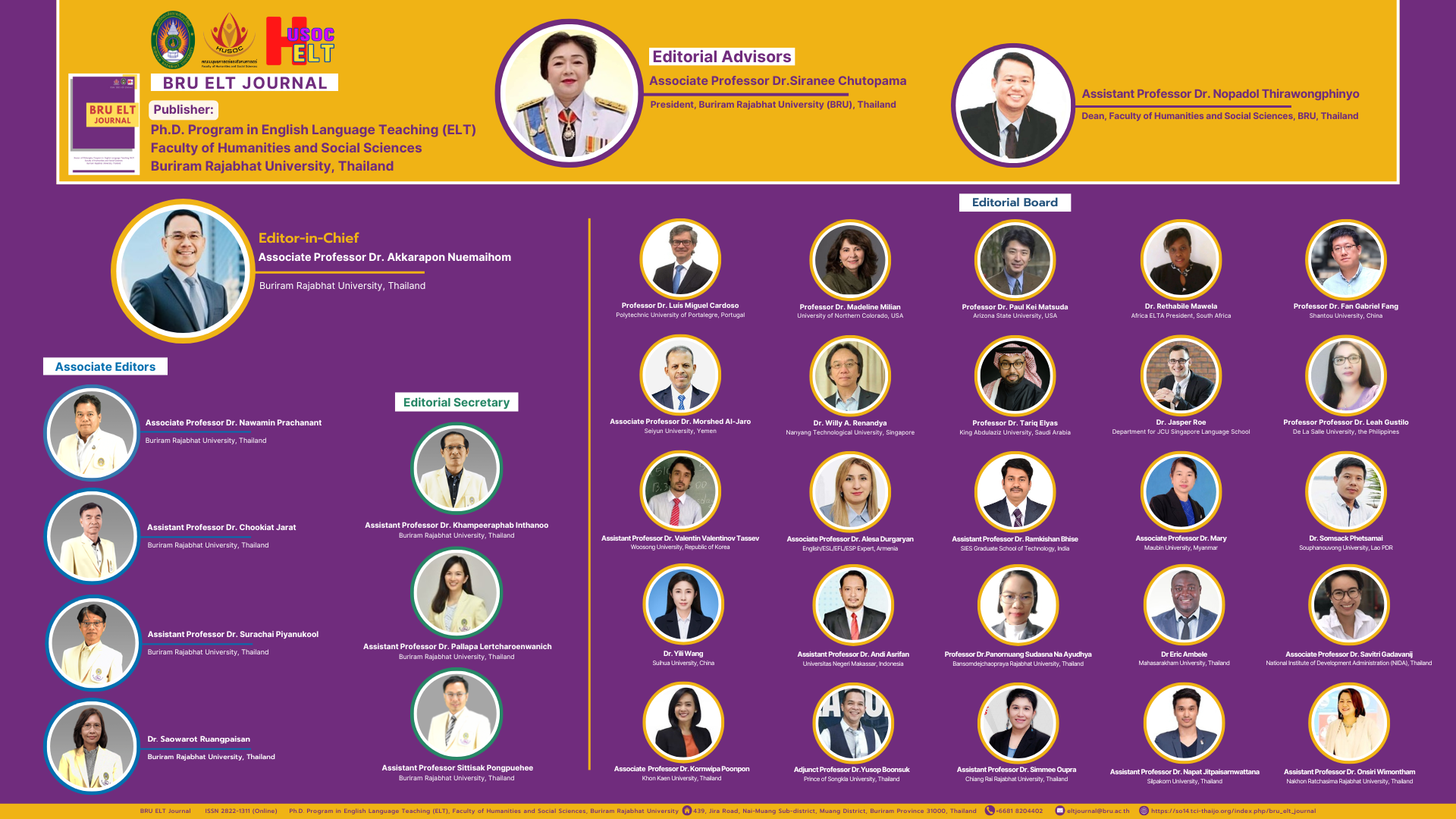English Teacher Recruiting Assumptions in Thai Secondary Education: Is the Extralocal Teacher of English Designation the Answer?
DOI:
https://doi.org/10.14456/bej.2023.8Keywords:
extralocal teacher of English, NES, NNES, Thai secondary educationAbstract
Whether to hire native English (NES) or non-native English speakers (NNES) as English teachers is a highly contested topic; based on this debate, this paper seeks to corroborate the recruitment criteria for English teachers in Thailand's secondary education system. Through random sampling, 100 of the most notable public and private secondary institutions that offer general English education were chosen. Of them, 87 published official recruiting documents. Rank order was used to distinguish the perceived importance of each recruitment criterion. The criterion that was most frequently and prominently stated was Nationality. As this criterion is considered the most significant when hiring English instructors, most English teacher hiring procedures in Thailand lack inclusivity and diversity because they prioritize nationality over important factors like language ability, educational background, and experience. To overcome this frame of mind, an all-inclusive designation that includes all non-local NES and NNES instructors should be implemented. It is therefore suggested that, seeing as English is a universal language and that many qualified English instructors come from various linguistic and cultural backgrounds, secondary education organizations should be encouraged to implement the uniform "extralocal teacher of English" (ETE) designation in place of the NES and the seemingly derogatory NNES teacher labels.
References
Aneja, G. A. (2016). (Non)native speakered: Rethinking (non)nativeness and teacher identity in TESOL teacher education. TESOL Quarterly, 50(3), 572–596. https://doi.org/10.1002/tesq.315
Bai, B., & Yuan, R. (2019). EFL teachers' beliefs and practices about pronunciation teaching. ELT Journal, 73(2), 134–143. https://doi.org/10.1093/elt/ccy040
Boonsuk, Y., Wasoh, F., & Fang, F. (2023). Native and non-native identity preferences in ELT hiring practices amid Global Englishes: The case of online job advertisements. Asia-Pacific Social Science Review, 23(1), 135–143. https://www.dlsu.edu.ph/wp-ontent/uploads/pdf/research/journals/apssr/2023-march-vol23-1/rb-2.pdf
Bowen, N. E. J. A., Satienchayakorn, N., Teedaaksornsakul, M., & Thomas, N. (2021). Legitimising teacher identity: Investment and agency from an ecological perspective. Teaching and Teacher Education, 108, Article 103519. https://doi.org/10.1016/j.tate.2021.103519
Cheng, L., Burgess, D., N, V., Solis-Barroso, C., McDermott, A., & Namboodiripad, S. (2021). The problematic concept of native speaker in psycholinguistics: Replacing vague and harmful terminology with inclusive and accurate
measures. Frontiers in Psychology, 12, Article 715843. https://doi.org/10.3389/fpsyg.2021.715843
Comprendio, L. J. E. V., & Savski, K. (2019). 'Asians' and 'Westerners': Examining the perception of '(non-)native' migrant teachers of English in Thailand. Journal of Multilingual and Multicultural Development, 41(8), 673–685. https://doi.org/10.1080/01434632.2019.1630419
Derwing, T. M., & Munro, M. J. (2015). Pronunciation fundamentals: Evidence-based perspectives for L2 teaching and research. John Benjamins Publishing Company.
Dewaele, J.-M., & Saito, K. (2022). Positive psychology can help overcome the pernicious native speaker ideology. The European Educational Researcher, 5(2), 225–234. https://doi.org/10.31757/euer.526
Floris, F. D., & Renandya, W. A. (2020). Promoting the value of non-native English-speaking teachers. PASAA, 59, 1–19. https://www.culi.chula.ac.th/ publicationsonline/files/article/UZAnTDjTO0Tue14723.pdf
Fought, C. (2006). Language and ethnicity. Cambridge University Press.
Fry, G. W., & Bi, H. (2013). The evolution of educational reform in Thailand: The Thai educational paradox. Journal of Educational Administration, 51(3), 290–319. https://doi.org/10.1108/09578231311311483
Hayes, D. L. (2009). Non-native English-speaking teachers, context and English language teaching. System, 37(1), 1–11. https://doi.org/10.1016/j.system. 2008.06.001
Holliday, A. (2015). Native-speakerism: Taking the concept forward and achieving cultural belief. In A. Swan, P. Aboshiha, & A. Holliday (Eds.), Encountering native-speakerism: Global perspectives (pp. 11–25). Palgrave Macmillan.
Holmes, F. (2022). An introduction to the analysis of ranked response data. Practical Assessment, Research, and Evaluation, 27, Article 7. https://doi.org/10.7275/tgkh-qk47
Hyltenstam, K., Bartning, I., & Fant, L. (2018). Introduction: High-level proficiency and the concept of nativelikeness in second language and multilingual research practice. In K. Hyltenstam, I. Bartning, & L. Fant (Eds.) High-level language proficiency in second language and multilingual contexts (pp. 1-15). Cambridge University Press.
Isaacs, T., & Rose, H. (2021). Redressing the balance in the native speaker debate: Assessment standards, standard language, and exposing double standards. TESOL Quarterly, 56(1), 401–412. https://doi.org/10.1002/ tesq.3041
Kamhi-Stein, L. D. (2016). The non-native English speaker teachers in TESOL movement. ELT Journal, 70(2), 180–189. https://doi.org/10.1093/elt/ccv076
Kaur, A., Young, D., & Kirkpatrick, R. (2016). English education policy in Thailand: Why the poor results? In R. Kirkpatrick (Ed.), English Language Education Policy in Asia (pp. 345–361). Springer.
Kiczkowiak, M. (2020). Recruiters' attitudes to hiring 'native' and 'non-native speaker' teachers: An international survey. TESL-EJ, 24(1), 1–22. https://www.tesl-ej.org/pdf/ej93/a4.pdf
Leonard, J. (2019). Beyond '(non) native-speakerism': Being or becoming a native-speaker teacher of English. Applied Linguistics Review, 10(4), 677–703. https://doi.org/10.1515/applirev-2017-0033
Li, S., & Jin, C. (2020). Analysis on whether native or non-native English speaking teacher is better in TEFL in China. Advances in Social Science, Education and Humanities Research, 416, 1098–1104. https://www.atlantis-press.com/article/ 125937068.pdf
Mahboob, A., & Golden, R. (2013). Looking for native speakers of English: Discrimination in English language teaching job advertisements. Voices in Asia Journal, 1(1), 72–81. https://154a5226-6f67-4763-b01a-60502fb2f488. filesusr.com/ugd/a8d6f0_2a56be9668b94bfaab940f5dddfe716f.pdf
Matsuda, A. (2017). Preparing teachers to teach English as an international language. Multilingual Matters.
Medgyes, P. (1992). Native or non-native: Who’s worth more? ELT Journal, 46(4), 340–349. https://doi.org/10.1093/elt/46.4.340
Methanonpphakhun, S., & Deocampo, M. F. (2016). Being an English language teacher: A narrative analysis of ten foreign teachers in Thailand. The New English Teacher, 10(2), 1–19. http://www.assumptionjournal.au.edu/ index.php/newEnglishTeacher/article/view/172 4/1512
Methitham, P. (2012). White prestige ideology and its effects on ELT employment in Thailand. The International Journal of the Humanities: Annual Review, 9(4), 145– 156. https://doi.org/10.18848/1447-9508/CGP/v09i04/43188
Perez-Amurao, A. L., & Sunanta, S. (2020). They are 'Asians just like us': Filipino teachers, colonial aesthetics and English language education in Thailand. Journal of Social Issues in Southeast Asia, 35(1), 108–137. https://doi.org/10.1355/sj35-1d
Ruecker, T., & Ives, L. (2015). White native English speakers needed: The rhetorical construction of privilege in online teacher recruitment spaces. TESOL Quarterly, 49(4), 733–756. http://www.jstor.org/stable/43893785
Saito, K., Tran, M., Suzukida, Y., Sun, H., Magne, V., & Ilkan, M. (2019). How do second language listeners perceive the comprehensibility of foreign-accented speech? Studies in Second Language Acquisition, 41(5), 1133–1149. https://doi.org/10.1017/s0272263119000226
Sanguanngarm, N. (2020). Factors affecting the failure of Thai education to equip Thai students with 21st Century skills. Rajabhat Chiang Mai Research Journal, 21(2), 1– 19. https://doi.org/10.14456/rcmrj.2020.13
Seargeant, P., & Swann, J. (2013). English in the world: History, diversity, change. Routledge.
Singh, R., & Mangat, N. (1996). Simple random sampling. In Elements of survey sampling (pp. 30–66). Springer. https://doi.org/10.1007/978-94-017-1404-4_3
Spohn, W. (2012). The measurement of ranks. In The laws of belief: Ranking theory and its philosophical applications (pp. 162–184). Oxford Academic. https://doi.org/10.1093/acprof:oso/9780199697502.003.0008
Tan, K. H., Jospa, M. E. a. W., Said, N. E. M., & Awang, M. M. (2021). Speak like a native English speaker or be judged: A scoping review. International Journal of Environmental Research and Public Health, 18(23), Article 12754. https://doi.org/10.3390/ijerph182312754
Tosuncuoglu, I. (2017). Non-native & native English teachers. Journal of History Culture and Art Research, 6(6), 634–638. https://doi.org/10.7596/taksad. v6i6.573
Walkinshaw, I., & Oanh, D. H. (2014). Native and non-native English language teachers. SAGE Open, 4(2), Article 215824401453445. https://doi.org/10.1177/2158244014534451






